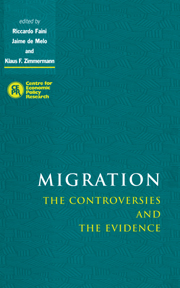Book contents
- Frontmatter
- Contents
- List of figures
- List of tables
- Foreword
- Acknowledgements
- List of conference participants
- 1 Trade and migration: an introduction
- PART ONE INSIGHTS FROM THEORY
- PART TWO QUANTIFYING THE LINKS BETWEEN TRADE AND MIGRATION
- 6 Trade and migration: a production-theory approach
- Discussion
- 7 Migration, dual labour markets and social welfare in a small open economy
- Discussion
- 8 Globalisation and migratory pressures from developing countries: a simulation analysis
- Discussion
- PART THREE HISTORICAL AND CONTEMPORARY EVIDENCE
- Index
8 - Globalisation and migratory pressures from developing countries: a simulation analysis
from PART TWO - QUANTIFYING THE LINKS BETWEEN TRADE AND MIGRATION
Published online by Cambridge University Press: 10 May 2010
- Frontmatter
- Contents
- List of figures
- List of tables
- Foreword
- Acknowledgements
- List of conference participants
- 1 Trade and migration: an introduction
- PART ONE INSIGHTS FROM THEORY
- PART TWO QUANTIFYING THE LINKS BETWEEN TRADE AND MIGRATION
- 6 Trade and migration: a production-theory approach
- Discussion
- 7 Migration, dual labour markets and social welfare in a small open economy
- Discussion
- 8 Globalisation and migratory pressures from developing countries: a simulation analysis
- Discussion
- PART THREE HISTORICAL AND CONTEMPORARY EVIDENCE
- Index
Summary
Introduction
Opposition to immigration in the North has been on the rise, notably in the EU and in the USA. This rising opposition can be traced to the regime shift in their labour markets which have moved from tight labour markets up to the early 1970s to rising unemployment (in the EU) and increasing wage inequalities (in the USA) since then. On the other hand, migratory pressures have not subsided. For many developing countries, stagnant growth in the wake of the debt crisis and explosive demographics have led to a marked deterioration in labour market conditions. The thawing of East–West relations has also contributed to greater migration pressure. Paradoxically, Western European governments, who used to criticise socialist regimes in Eastern Europe for imposing draconian restrictions on people mobility, reacted to the 1989 events by swiftly implementing new and more effective migration control measures.
As pointed out by Schiff (1996), the change in attitude in the North towards immigration from the South is well exemplified by the change in attitudes in the International Labour Organisation (ILO). Not surprisingly, during the period of tight labour markets in the North, the ILO recommended attracting suitable labour from the South (ILO, 1949). But by the mid-1980s, the ILO was recommending that the receiving countries should
endeavour to cooperate more fully in the development of such countries by appropriate intensified capital movements, the expansion of trade, the transfer of technical knowledge.
(ILO, 1984)- Type
- Chapter
- Information
- MigrationThe Controversies and the Evidence, pp. 190 - 220Publisher: Cambridge University PressPrint publication year: 1999



